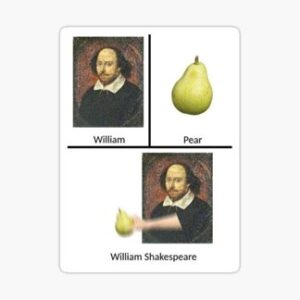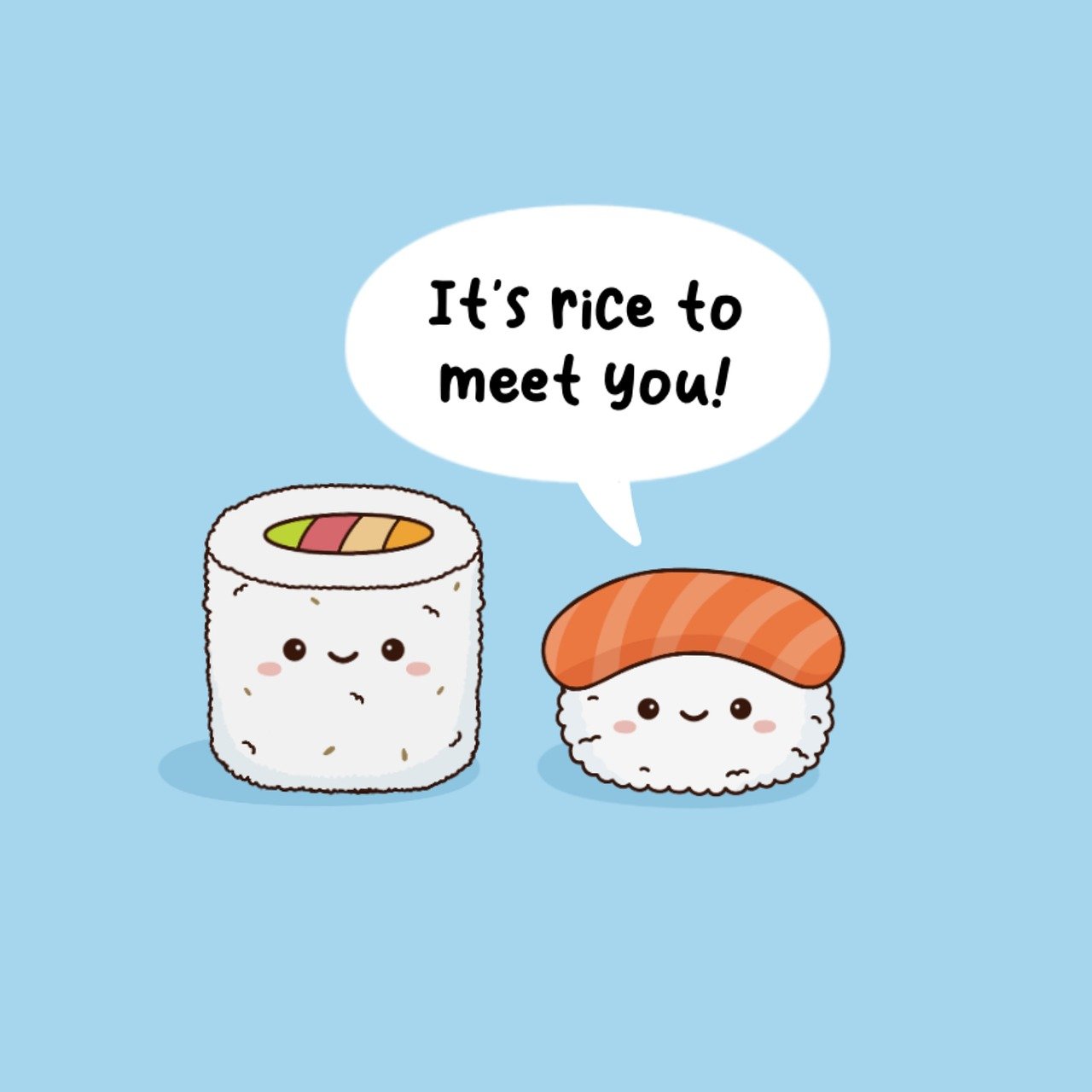“Por que o cavalo estava no orelhão? Porque ele foi passar um trote”, “O que a Xuxa foi fazer no bar? Beber caSasha.”, “Quando o Papai Noel morrer, ele não estará mais em trenós”.
Quem nunca deu uma de “tio do pavê” e fez um trocadilho que muitas vezes não foi lá tão bom, mas engraçado ao mesmo tempo, tipo esses aí de cima?
No artigo de hoje, vamos brincar com as palavras e conhecer algumas dessas piadas com trocadilhos, só que em inglês – as famosas “puns”. Prepara o tio do pavê que existe em você e vem!
Índice
- História dos trocadilhos
- A piada mais antiga do mundo
- Os trocadilhos (pun) em inglês
- Para os fãs de Adele
- Para os amantes de memes
- Para a galera da gramática
- Para os amantes ou intolerantes à lactose
- Para a galera das Ciências
- A grande resposta
1. História dos trocadilhos
Os trocadilhos, conhecidos em inglês como “puns”, têm uma longa história. Em muitas sociedades antigas, como as egípcias, gregas e romanas, os trocadilhos eram frequentemente usados em peças teatrais, poesia e até mesmo na política. Na literatura clássica, encontramos exemplos de trocadilhos em obras de autores como Shakespeare, acredita?
Apesar disso, foi na Idade Média que os trocadilhos ficaram bem populares, especialmente por causa dos trovadores e dos jograis, que utilizavam essa forma de humor em suas apresentações. É claro que, com os anos, os trocadilhos foram se desenvolvendo e se adaptando às diferentes culturas e línguas, sendo muito utilizados hoje em dia em diferentes formas de entretenimento.
2. A piada mais antiga do mundo
Acredite, existem registros da primeira piada conhecida na história! E a melhor (ou pior) parte é que ela é no estilo “tio do pavê”. Sobre qual tema você acha que ela é? Vote mentalmente a seguir e leia o artigo até o final para descobrir.
- Bebida alcoólica
- Flatulência
- Sexista
3. Os trocadilhos (pun) em inglês
Talvez uma das grandes vantagens de aprender inglês seja entender esses trocadilhos tão bobos, mas que deixam a gente estranhamente feliz. Já parou para pensar o que torna os trocadilhos tão legais?
É claro que, como em português, em inglês os trocadilhos dependem do uso de palavras com múltiplos significados ou com sons semelhantes. Essa é a grande essência para fazer um ótimo ‘pun’ (querido leitor, volte e leia novamente essa última frase se você não percebeu que fiz uma piadinha boba misturando português com inglês hehehe).
Vamos a alguns trocadilhos em inglês, finalmente!
- Para os fãs de Adele:
Why did Adele cross the road? To say hello from the other side.
Adele é uma famosa cantora conhecida pela música “Hello”. Esse trocadilho usa a frase “the other side” (o outro lado) para fazer referência à letra da música e ao fato de atravessar a rua.
- Para os amantes de memes:

Aqui, temos o trocadilho utilizando o sobrenome Shakespear com o verbo “to shake” (chacoalhar) e a palavra “pear” (pera).
- Para a galera da gramática:
Thanks for explaining the word “many” to me, it means a lot.
Neste trocadilho, a palavra “many” (muitos) é interpretada de duas maneiras: “it means a lot” (significa muito) pode ser entendido literalmente como agradecimento por explicar o significado da palavra “many”, mas também como “it means a lot” (isso significa muito), dando a entender que a explicação é importante.
- Para os amantes ou intolerantes à lactose:
A man just assaulted me with milk, cream and butter. How dairy.
Nessa, “dairy” (laticínios) é um trocadilho com “how dare he” (como ele se atreve), dando a entender que alguém o atacou com produtos lácteos (milk, cream e butter), mas também brincando com o som da palavra “dairy”.
- Para a galera das Ciências:
RIP boiled water. You will be mist.
Nosso último trocadilho faz um jogo de palavras com a palavra “mist” (névoa) e “missed” (no sentido de perder ou sentir falta). Ao ferver água, ela se transforma em vapor (mist), então o trocadilho diz “you will be mist” como se estivesse dizendo que a água fervida será vapor e também como se estivesse dizendo “you will be missed” (sentirei sua falta).
4. A grande resposta
Agora que já quebramos a cabeça e demos algumas risadinhas, se lembram da piada mais antiga do mundo? Chegou a hora de saber do que ela se trata!
Segundo o professor Paul McDonald, da Universidade de Wolverhampton, a primeira piada do mundo está preservada em tabuletas desgastadas que datam da antiga Babilônia.
A piada é no grande estilo “tio do pavê” ou “quinta série”, como você preferir, já que ela fala sobre flatulência. Tinha que ser, né?
Ela vem de um ditado dos antigos sumérios (povo que vivia na região sul do atual Iraque): “Algo que não acontece desde tempos imemoriais: uma jovem jamais peida no colo do marido”.
Depois dessa, você deve estar que nem o passageiro perguntando para o motorista: a que ponto chegamos?
Versão em Inglês
Pun: the wordplay joke in English
“Why did the horse stand by the telephone booth? Because he was going to make a prank call,” “What did Xuxa do at the bar? She drank CaSasha”, “When Santa Claus dies, he won’t be in sleds anymore.”
Who has never acted like the “uncle of the pavê” and made a pun that often wasn’t all that good, but funny at the same time, like the ones above?
In today’s article, let’s play with words and get to know some of these wordplay jokes, but in English – the famous “puns”. Get ready to unleash your inner “uncle of the pavê” and let’s go!
Index
- History of the puns
- The oldest joke in the world
- English puns
- For Adele fans
- For meme lovers
- For the grammar folks
- For lactose lovers or intolerants
- For the Science crowd
- The big answer
1. History of the puns
Puns have a long history. In many ancient societies, such as the Egyptians, Greeks, and Romans, puns were often used in plays, poetry, and even in politics. In classical literature, we find examples of puns in the works of authors such as Shakespeare, believe it or not?
However, it was in the Middle Ages that puns became very popular, especially because of the troubadours and minstrels, who used this form of humor in their performances. Of course, over the years, puns developed and adapted to different cultures and languages, being widely used today in different forms of entertainment.
2. The oldest joke in the world
Believe it or not, there are records of the first known joke in history! And the best (or worst) part is that it’s in the “uncle of the pave” style. On what subject do you think it is? Vote mentally below and read the article to the end to find out.
- Alcoholic beverage
- Flatulence
- Sexist
3. English puns
Perhaps one of the great advantages of learning English is to understand these silly puns that oddly make us happy. Have you ever stopped to think about what makes puns so cool?
Of course, like in Portuguese, in English puns depend on the use of words with multiple meanings or similar sounds. That’s the essence of making a great ‘pun’ (dear reader, come back and read that last sentence again if you didn’t notice that I made a silly joke mixing Portuguese with English hehehe).
Let’s go to some English puns, finally!
- For Adele fans:
Why did Adele cross the road? To say hello from the other side.
Adele is a famous singer known for the song “Hello”. This pun uses the phrase “the other side” to reference the song lyrics and the act of crossing the road.
- For meme lovers:
Here, we have the pun using Shakespeare’s last name with the verb “to shake” and the word “pear”.
- For the grammar folks:
Thanks for explaining the word “many” to me, it means a lot.
In this pun, the word “many” is interpreted in two ways: “it means a lot” can be understood literally as a thank you for explaining the meaning of the word “many,” but also as “it means a lot,” implying that the explanation is important.
- For lactose lovers or intolerants:
A man just assaulted me with milk, cream, and butter. How dairy.
In this one, “dairy” is a pun with “how dare he,” implying that someone attacked him with dairy products, but also playing with the sound of the word “dairy.”
- For the Science crowd:
RIP boiled water. You will be mist.
Our last pun plays with the word “mist” and “missed.” When boiling water, it turns into vapor (mist), so the pun says “you will be mist” as if it were saying that the boiled water will be vapor and also as if it were saying “you will be missed.”
4. The big answer
Now that we’ve scratched our heads and had a few chuckles, do you remember the oldest joke in the world? It’s time to find out what it’s about!
According to Professor Paul McDonald of the University of Wolverhampton, the world’s first joke is preserved on worn tablets dating back to ancient Babylon.
The joke is in the great style of “uncle of the pave” or “fifth grade,” as you prefer, since it’s about flatulence. It had to be, right?
It comes from a saying of the ancient Sumerians (a people who lived in the southern region of present-day Iraq): “Something that never happened since time immemorial: a young woman never farted in her husband’s lap.”
After this, you must be like the passenger asking the driver: how far have we come?
Escrito por: Priscilla Ribeiro – Professora de Inglês na Idioma Independente em Pindamonhangaba – SP.
Para contato: mpriscillaribeiro.ii@gmail.com


